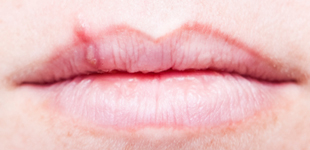 Cold sores can be a nuisance if appropriate care is not taken when treating them. Unfortunately, once you get your first cold sore the virus stays in your body for life.1 Like other ailments, the virus needs to be treated with a proper regimen in order to minimize the chances of it popping up again.
Cold sores can be a nuisance if appropriate care is not taken when treating them. Unfortunately, once you get your first cold sore the virus stays in your body for life.1 Like other ailments, the virus needs to be treated with a proper regimen in order to minimize the chances of it popping up again.
Fortunately, there are a number of cold sore treatments – both over-the-counter (OTC) and prescription – that can be used to alleviate symptoms. There are also preventative measures you can take to try and prevent cold sores from forming in the first place.
If you suffer from frequent cold sores, below is a list of potential triggers to avoid. Avoiding these common triggers has been shown, in some cases, to help keep cold sores beneath the surface and dormant.
Sun Exposure2
Being overexposed to the sun is not good for anyone’s skin, especially the lips. The lips are very delicate and tend to dry out rather quickly.
Any time you find yourself in the sun, make sure to drink plenty of water to stay hydrated. Also, apply a lip balm with SPF protection and wear a hat whenever possible to keep your lips shaded from direct sunlight.
Stress2
Dealing with stress can be very difficult. There is nothing worse than being stressed out, only to look in the mirror to discover an oncoming cold sore. Once the cold sore is visible, self-consciousness tends to increase our stress level.
Whenever you feel stressed, focus on doing things that relax you. Sleeping, exercising or spending time with family and friends are great ways to unwind. This relaxation could help keep those unsightly cold sores from reappearing
Skin Contact and Saliva2
The cold sore virus is transferred through the sharing of saliva with an infected person. Saliva sharing can happen by kissing, sharing food utensils and beverages or even by not properly washing your hands.
It is important to note that cold sores often take some time to heal. According to Onhealth.com, it often takes 7 to 10 days from the first sign of a cold sore for it to completely disappear, and the skin to heal. If you are in a relationship and notice that your partner is developing a cold sore, be sure and give him or her plenty of time to heal before kissing or sharing food and drinks. Even if you are not able to see the cold sore on the surface, your partner could still be contagious.
Seek Out a Physician
Even if you take appropriate precautions, you are never guaranteed to prevent a cold sore from coming on. If you are prone to getting cold sores, contact your physician and ask about Sitavig® (acyclovir), 50mg Muco-Adhesive Buccal Tablet. Sitavig is a breakthrough cold sore spot treatment that is safe, effective and discreet. Sitavig offers one and done dosing that has been proven to stop a cold sore from developing in some patients when taken soon after symptoms emerge.
1- WebMD get more.com – Understanding Cod Sores Basics
2- WebMD.com Cold Sores Topic Overview
IMPORTANT SAFETY INFORMATION
Sitavig should not be used in patients with known hypersensitivity to acyclovir, milk protein concentrate, or other components of the product.
Sitavig has not been studied in pregnant women or in immunocompromised patients and no interaction studies have been performed. Sitavig’s safety and efficacy have not been established in pediatric patients.
Sitavig is a Pregnancy Category B product; therefore it should be used during pregnancy only if the potential benefit outweighs the potential risk to the fetus. It is not known if Sitavig is excreted in breast milk; however, systemic absorption is minimal.
In a controlled clinical trial Sitavig’s most common side effects (greater than or equal to 1%) were: headache (3%), dizziness (1%), lethargy (1%), gingival pain (1%), aphthous stomatitis (1%), application site pain (1%), application site irritation (1%), erythema (1%) and rash (1%). In the same trial these side effects ranged from 0%-3% for placebo.
You are encouraged to report negative side effects of prescription drugs to the FDA. Visit www.fda.gov/medwatch.com or call 1-800-FDA-1088.